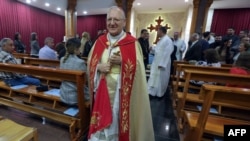Iraq's largest Christian denomination, the Chaldean Catholics, are canceling Easter celebrations this year to protest a presidential decision revoking the title of Patriarch from Chaldean Catholic Cardinal Louis Sako.
Though Easter is considered the most important festival of the Christian calendar celebrating Jesus' death and resurrection, Easter Sunday in Iraq will be observed this year only through prayers, the Chaldean Catholic Patriarchate in Baghdad announced Monday. All festivities, Mass ceremonies and processions, media coverage and reception of government officials are canceled in a sign of solidarity with Sako.
The move highlights political tensions between groups linked to Iran-backed militias and those who oppose them, fearing their growing dominance in government and daily life.
The Chaldean Catholic Church is an ancient Eastern rite church in full communion with the Holy See. Iraq's Chaldean Catholics say they are protesting the removal of the title Patriarch from Sako by Iraqi President Abdul Latif Rashid last July. In protest, the cardinal moved from Baghdad to Irbil, the capital of the northern autonomous region of Kurdistan that same month, and was welcomed by the Kurdish leadership.
Critics say a rogue Christian lawmaker and militia leader closely linked to Iran, Rayan al-Kildani, influenced the president's decision. The U.S. Treasury Department sanctioned al-Kildani in 2019 for alleged human rights abuses, while others accuse him of seeking control of Chaldean Church assets, including properties that Cardinal Sako oversees.
Nadine Maenza is the president of the Washington-based International Religious Freedom Secretariat. It encourages the improvement of religious freedom conditions in 40 countries worldwide, including Iraq. She told VOA cancellation of Easter festivities in Iraq points to the growing pressure Christians and other minorities face as Iran's influence grows in the country.
"The situation for Christians is dire," said Maenza. "The Iranian militias used to be a threat as a nonstate actor, but now their influence on the Iraqi government itself is also troubling. So we see an environment hostile for Iraq which is why Cardinal Sako left Baghdad and moved into the Kurdistan region. It's troubling to see what this means for one of the oldest Christian communities in the world."
Sako made the landmark visit to Iraq of Pope Francis possible during the 2021 coronavirus pandemic. He told VOA that the pope's visit made a major impression on ordinary Iraqis, but a different government is now in place, influenced by Iran. Sako has worked for years for all of Iraq's religious and ethnic minorities to have equal citizenship rights. He hopes a visit to Washington next month by Iraqi Prime Minister Mohammed Shia al-Sudani might yield benefits.
"The situation is very critical, and Christians have no trust for the future because there is no vision and no plans for a real change of a real state of law, democracy, respect in which everyone can live in dignity and freedom," said Sako. "Christians are still leaving the country because there are no actions, only promises. The prime minister is visiting the United States. I hope they can do something to ask him for the benefit of Christians and keep Christians in their land and hoping and living in dignity and freedom. The Iraqi population is different, they are so nice with us. The pope during his visit changed their minds. They are showing us their solidarity, but not the political class."
Maenza warns that if a high-profile Christian leader such as Sako found the threats in Baghdad difficult, forcing him to relocate to Kurdistan, "imagine the vulnerabilities other Christians feel with the growing threats from Iran-backed militias."
Commenting on the current political situation, Greg Kruczek of Penn State University in the United States wrote, "Iraq's larger political forces do not make decisions to benefit minority communities. They make decisions based on their rivalries with one another that often have a detrimental effect on Christians and other minorities." His remarks are found in the online academic The Duck of Minerva publication.
Before the U.S.-led invasion of Iraq, there were some 1.5 million Christians in Iraq but sectarian violence over the years has dwindled their numbers to some 150,000 according to the 2022 Report on International Religious Freedom by the U.S. State Department.










